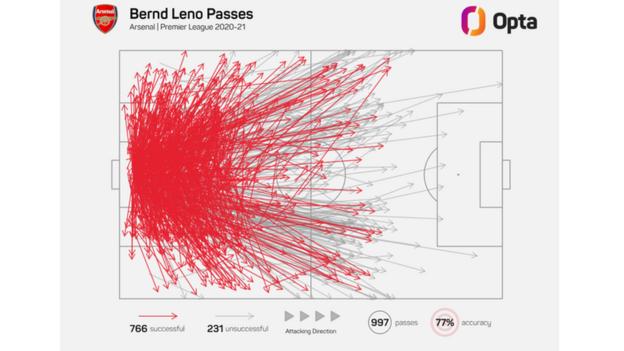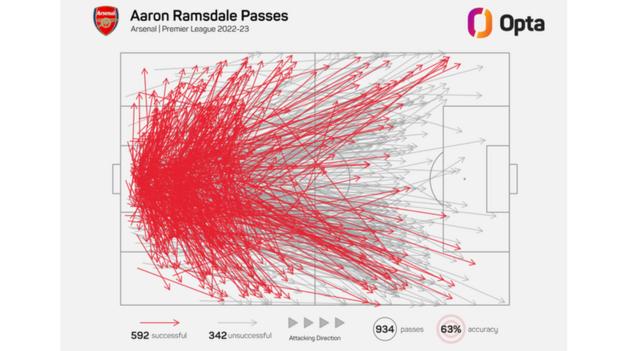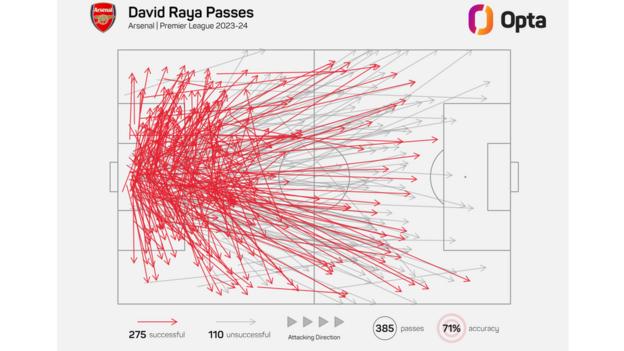While it is easy to see the difference that summer signing Declan Rice has made to Arsenal’s midfield, if there has been any upgrade at all from the Gunners’ change of goalkeeper this season then it is much less clear-cut.
It is four months since Arsenal signed David Raya on loan from Brentford and Mikel Arteta spoke about ripping up the rule book and rotating him with his existing number one Aaron Ramsdale.
That has not happened and, despite digging into the stats behind both keepers over the past five years and watching them as much as possible in recent weeks, I am still pretty flummoxed about why he brought in Raya and made him first choice.
It just seems like this situation was completely unnecessary, because it’s not as if Arteta has changed the way his side play and needed someone with a different skillset.

It appears the only rationale behind bringing Raya in was because his distribution was perceived to be better, because there is so little difference otherwise. They are such similar goalkeepers in so many aspects of their play and past performances, that it makes me wonder if there is something else behind Arteta’s decision, and what it was led by.
After all, Arteta has done this at Arsenal before – when he signed Ramsdale from Sheffield United in 2021 and took over from Bernd Leno, who had a season in the shadows before joining Fulham in 2022.
At the moment, it looks like Ramsdale’s campaign is heading the same way – unless he pushes for a move in January to boost his chances of making the England squad for Euro 2024.
It appears Leno wasn’t replaced because of his distribution – the Arsenal team was completely different in 2020-21 – but if you compare his pass-map from then to Ramsdale’s in 2022-23, they are scarily similar in terms of the number of sideways passes and the target areas.

Leno was also doing well in terms of making saves he was expected to – statistically, he was over-performing by around 1% in relation to the quality of shots he was facing.

It’s the same with Ramsdale – he is under-performing now by that same metric, for reasons that I have explored. But other than the occasional odd decision or situation, there were no obvious issues that led to him being put in this position, or anything exceptional from Raya that made him stand out.

We still don’t understand what Arteta is trying to do
It would be easier to understand what Arsenal are doing if Raya was excelling in goal for them. He’s done OK, but he has made some glaring errors, particularly positionally, at crosses.
I spotted a trend where Ramsdale was closer to the near post in those situations in the past and now Raya keeps getting caught out in the same way because he is just not economical enough with his movement.

I am wondering if that is down to what they are being told to do, as in aggressively challenging that near post.
It’s happened to me in the past where someone – be it the manager or goalkeeper coach – has put an idea in my head and you kind of go too far in focusing on it.
There is this consensus that having competition for places is healthy, but I started thinking that, if they both have this overly-aggressive focus on getting the starting place, it could lead to this type of almost overly-assertive decision-making – to show they are actively working on whatever it is they have specifically been asked to do.
I would love to know who is pulling the strings there and what is actually behind the decisions that are being made.
Inaki Cana, Arsenal’s first-team goalkeeper coach, worked with Raya at Brentford but was at the club when they signed Ramsdale.

Presumably he had some input there as well, but Arteta obviously has the final say and I think my biggest takeaway from all this is that we have got this far into the season without really understanding what he is trying to do.
I even looked at Arsenal’s attacking output, in case Arteta might be thinking that Raya’s more consistent distribution would improve the team’s performance going forward – but the Gunners actually created more chances, and of higher quality, when Ramsdale was in the team.
| Premier League | Ramsdale (2022-23) | Raya (2023-24) |
| Minutes | 3420 | 1170 |
| Open play sequences involved in | 21.66 | 25.8 |
| Shot-ending open play sequences | 0.92 | 0.46 |
| Goal-ending open play sequences | 0.08 | 0 |
| xG chain | 0.09 | 0.04 |
| Overall xG per game | 1.9 | 1.75 |
The question I am constantly seeing discussed on this subject is, ‘so, who is better?’. But I think the discussion that needs to be happening is based on what is going on around their performances, and what difference Raya’s calmness brings to the side compared to Ramsdale’s eagerness.
As it stands, we are only really hearing from Arteta about it and, right from the start, it has been down to him to decide what he wants the story to be.
We are talking about a perfectionist of a manager and it is obviously fine margins that decide whether or not you win the Premier League or not.
But at the moment it feels like Arsenal’s failure in the final few weeks of last season is all being put on Ramsdale, which doesn’t seem fair.
I also don’t really believe Raya is that much better to make the difference in Arsenal’s title bid this time.
They are doing well with him in goal, of course, but they were top at this stage last season too with Ramsdale.
Ramsdale has lost relationship with his defence
The most frustrating thing about this scenario for Ramsdale is that it has happened through no fault of his own.
When he faced Fulham in August, he was criticised when Bukayo Saka’s wayward pass led to a counter-attacking goal from Andreas Pereira in the opening minute.

While Ramsdale would probably admit he could have done things differently, the reason he was out of his goal in the first place was because he is asked to be in a support position when Arsenal have possession – and then Pereira also did well to recognise his recovery line and body shape to wrong-foot him as he tried to recover.

It is not as if he has stopped doing the things that led Arsenal to sign him, and Arteta has not dramatically altered the way his side play out from the back.

There are more questions than answers about the scenario Ramsdale is in, but one thing I am certain about it that it is harder for him to impress Arteta now, whether or not there is any chance of him getting his place back.
Having familiarity with the players in front of you is hugely important for any keeper and, by playing so little in the past few months, Ramsdale has lost the close relationship he had with his defence.
The patterns of Arsenal’s play haven’t changed since last season, but maybe how they are executed has altered.
I know from my own experience as a keeper that, whatever the reason, if you are out of the team for a while you lose the connection with your team-mates that means you understand, habitually, what they all prefer.
That’s what happened when Ramsdale came back into the team against Brentford, when Raya was ineligible to face his former club, and a difficult situation was made harder because the Bees press so high, so efficiently and so aggressively.

Which brings me to the other problem Ramsdale has right now, which is that because he plays so infrequently, he is under the microscope and any error or bad decision is highlighted.
What is the difference then?
It is hard to make any fair comparison between Ramsdale and Raya this season for the reasons above, so I went back through the past five years to look at their progress and performances over that period.
In that time, Ramsdale played for two clubs, Bournemouth and Sheffield United, who were relegated from the top flight so I kind of expected him to have faced a ton of shots, but so did Raya.

Again, in relation to the quality of shots they were facing, Ramsdale did slightly worse overall in that five-year period and conceded -7 expected goals, whereas Raya exceeded expectation by +4.
Statistically, that makes Ramsdale the seventh-worst keeper out of the 52 who have played 10 or more Premier League games since the 2019-20 season, but I think you have to factor in that he faced the second most shots on target in total.
Believe it or not though, Raya actually faced more shots per game in that period so, technically, he has done slightly better.

Even so, these are really fine margins and, most of the time, Raya was performing in line with what he was expected to save and concede.
Arguably the biggest difference between the two keepers is in their demeanour. Raya appears much calmer and is more consistent in his performance levels – the difference between his best and worst displays seems less pronounced than Ramsdale, who is also more animated and, occasionally, excitable.
Ramsdale has already admitted he sometimes struggles to concentrate for 90 minutes, but the tumultuousness around his situation for club or country is hardly going to help there and, whether you want to admit it or not, that can potentially affect your preparation and decision-making during games.
When you have the backing of your manager, it gives you an element of freedom to be able to play without worrying about it too much. It’s completely the opposite when, like him, you don’t really know where you stand.
Ramsdale has experienced both sides of it, where he came in and was first choice and you could see that gave him confidence in the way he played.
Now, suddenly the boot is on the other foot and he is essentially experiencing what Leno went through.
I know myself what it is like to feel appreciated by your manager, or not – and the difference it makes to your mindset and, as part of that, your performances. The same applies to your relationship with your goalkeeping coach, even if it is the manager who has the final say on whether you play or not.
It is hard to show that effect with any certainty using statistics but I found it interesting to see what Leno said about Fulham’s goalkeeper coach, Hugo Oliveira, at the start of this year. He talked positively about honesty and trust as well as how he enjoyed the way he trained, and how it is important that was.

In 2022-23, Leno over-performed in relation to the quality of shots he faced by a massive 13% and maybe the fact he was playing for someone who believes in him has played a part in that improvement.
If nothing else, it shows the impact of proper communication about where you stand on a player’s morale and mental health, and how damaging it can be to get that part wrong.
Whatever Arteta says about the situation now, it is down to Ramsdale to decide what he does next. With his place in the England squad on the line, it would be understandable if he has had enough.
Karen Bardsley was speaking to BBC Sport’s Chris Bevan.
Source
Disclaimer: No copyright infringement intended. All rights and credits reserved to respective owner(s).























Add Comment